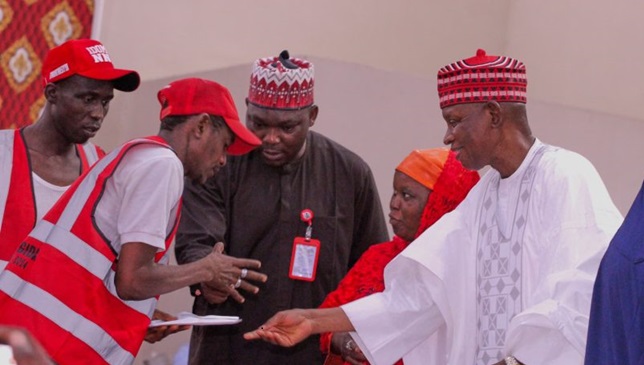Kano state governor, Abba Kabir Yusuf, in his effort to empower youths to be self-reliant, has disbursed the sum of N23,250,000 to street hawkers in the state.
However, each of the beneficiaries got a sum of N50,000 to assist them in boosting their work.
Governor Yusuf said that this is in fulfilment of his administration’s promises to continue to accord priority to vulnerable groups, especially youth and women by improving their various trades and skills through occasional intervention for continued life sustenance.
He disclosed that street hawkers trading along nine junctions out of the 38 across the state were captured in this phase of empowerment which include; K/Dan’Agundi, K/Famfo, Gidan Murtala, Tal’udu and Magwan Junction.
Governor Yusuf also listed other areas as Abuja Yandusa (Sani Marshal Road), Maiduguri Road, Iyaka and Commissioner Roads, while reassuring the remaining 28 junctions will equally be accorded with the desired attention until all of them are covered.
He then described the youths as patriots who, through thick and thin, faced the challenges of poverty and deprivation by treading the path of honour, dignity and respect.
Continuing, he added that taking into cognizance the immense social and economic benefits derived from this group of citizens, his administration had revived the once-moribund and ineffective Directorate of Cottage, Trade and Street Hawking by appointing a Director General with functional departments and units to ensure that Street Hawkers and Cottage are fully engaged and supported in all ways possible.
The governor however urged them to make judicious utilisation of the funds received to expand their respective businesses in order to generate a positive multiplier effect in the economy of the state, while praying to Almighty Allah to continue to guide and protect all in this and similar endeavours throughout his tenure.
However, it will be recalled that Governor Yusuf recently empowered 5,200 women beneficiaries with N50,000 each which is equivalent to the total sum of N260,000,000.00 with positive feedback indicating such initiatives had started yielding positive results as the socio-economic status of the beneficiaries was said to have increased.
